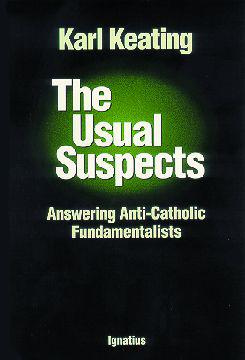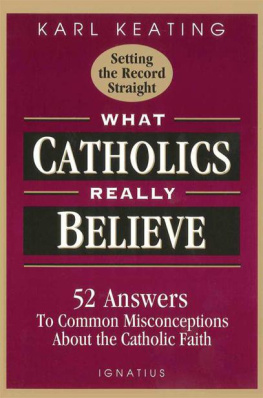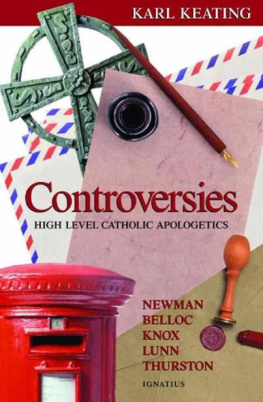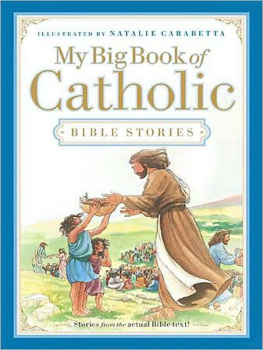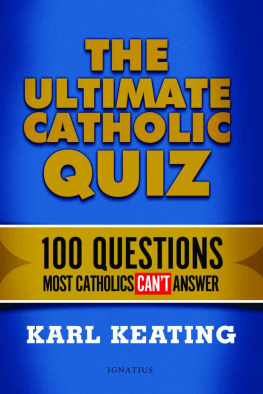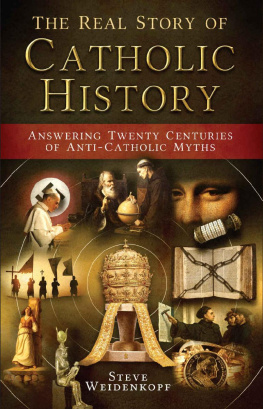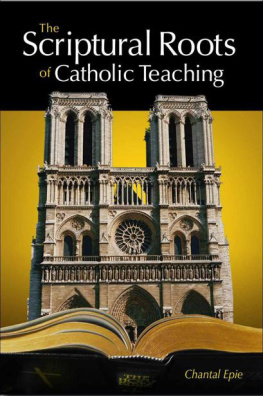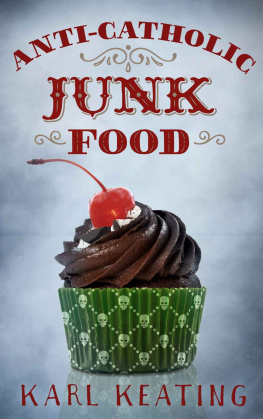THE USUAL SUSPECTS
Karl Keating
THE USUAL SUSPECTS
Answering Anti-Catholic Fundamentalists
IGNATIUS PRESS SAN FRANCISCO
Cover design by Roxanne Mei Lum
2000 Ignatius Press, San Francisco
All rights reserved
ISBN 978-0-89870-773-1
Library of Congress catalogue number 99-75400
Printed in the United States of America
For Justin
CONTENTS
| Advice and Dissent
| Near the Edge
| Over the Edge
| Its a Wrap
PREFACE
This book is not so much a sequel as a supplement to Catholicism and Fundamentalism . In that book I tried to give a panoramic view of the attack on Romanism by Bible Christians, highlighting prominent anti-Catholic individuals and organizations and discussing at length controverted doctrines. Here I present snapshots, individualized portraitssome larger, some smallerof arguments and people opposed to the Catholic faith.
The first eight chapters give an overview, from several different angles. The second eight recount attacks and confusions that may strain credulity but still fall within the realm of civil discourse. The third eight feature journeys into the bizarre. I draw things to a close with reviews of two video productions.
Determining which chapters should fall into which sections was not easy. Readers who think some chapters ought to swap places will not receive a complaint from me. De gustibus non est disputandum.
PART ONE
Advice and Dissent
The Roman System Way
A subscriber to the magazine I used to edit wrote to tell me she did not need answers from Catholics any longer:
Gods Word, the Bible, has become exactly that to me! Ive found without a doubt his Word is all I need! He causes me to grow as I study it and sit under good Bible preaching where everyone brings a Bible to follow along as he compares Scripture to Scripture! When I accepted the Lord Jesus as my personal Lord and Savior, I had no intention of leaving Holy Mother the Churchin fact, I thought now Ill be like the others and know the what, where, and why of it all.... And then I started listening to the priest at Mass, and I could see I would have to choose one or the other: the Bible way or the Roman system way. The answer is obvious. Then, when I got together with the parish priest, he told me I was too fanatic about the Bible! I replied, Thank you for the compliment. What more did I need?... No more literature, please.
Reading between the lines, you can imagine what happened. The story is a common one. This woman found no intellectual fulfillment at her parish. Probably, like many parishes, it was just coasting, and she was a once-a-week Catholic. Then a Protestant friend invited her to a service at the neighborhood born-again church. At first my correspondent put her off. Going seemed a bit disloyal, and what did Bible thumpers have to offer anyway? (All she knew about born-agains she had gathered from reruns of Elmer Gantry.)
But her friend kept pestering her, in a gentle way, and finally she consented. Ill sit through it once, she thought, and that will be it. Well, it certainly was itit was just what she was looking for. She discovered good Bible preaching. Here was a minister who spoke her language, convicted her of sin, and seemed to have the Bible memorized. He was at once blunt in condemnation of the easy, quasi-Christian life she had been living and had been satisfied with (more or less) and encouraging in his eagerness that Christianity be extended to all. What is more, he did not look or sound like Elmer Gantry. He did not wear polyester or a leisure suit, and he did not wear expensive suits either. He did not look like a huckster, a nerd, or a con artist. He had a soothing voice and could speak (how to describe it?) not professionally (he was not polished or slick) but honestly, from the heart. He would not be mistaken for a scholar, but he clearly was a believer. And he was friendly. After the service her friend introduced her to the minister, and he introduced her to others at the small church. At her home parish there was a rigorous anonymity. You could attend for years and be recognized as a regular, but no one would know your name. Here, at this small church, everyone seemed to know everyone.
That is how it all started. She was invited to join a Bible study class. Why not? she thought. She dusted off the family Bible and went, but soon put that Bible aside and purchased a King James Version so she could read along with the others. She was surprised to find she enjoyed reading the Bible, and she read it often. At the Bible study she at first bristled when people said the Bible supported this or that doctrinedoctrines opposed to what the Catholic Church taught. It was not that they bad-mouthed Catholicism as such. Actually, Catholicism hardly ever came up. Instead, it was pointed out to her that peculiarly Protestant doctrines were true, and by implication peculiarly Catholic ones were not.
She read, for instance, about the brethren of the Lord. She always had thought these were Jesus cousins, but everyone at the Bible study insisted they were his brothers-german. What they said seemed to make sense. At least she did not have anything to say on behalf of the Catholic position. (Of course, she did not really know what the Catholic position was based on, so she should have expected it to seem inadequate.)
So it went. Week after week she attended both Mass and the Protestant service, and she joined in the Bible study. She became convinced that everything to be believed must be found plainly on the face of the Bible. The Bible was written for simple people, she was told, so there could not be a need to draw out tendentious inferences. She realized, after a while, that she was happier attending the Bible study or the Protestant service than attending Mass. The priest did not have much to say anyhow, just a lot of banal comments about political issues in which she took no interest (neverto her, a telling pointany comments about sin).
Then came the hard sell, though she did not see it as such. Her new friends explained that Catholicism is not really Christianity as Christ intended it. Instead, it is a religious system . That means it is a scheme through which you effect your own salvation by doing things: going to Mass, taking Communion, going to confession, getting indulgences, praying to statues, and so on. You either choose the Bible way or the Roman system way, she was told.
By this time she knew where her affections layshe simply liked the Protestants more than the Catholics, the minister more than the priestand it seemed her beliefs were moving in the same direction as her feelings. She thought she would give the Catholic Church one last chance. She made an appointment to see her pastor and was not surprised that he did not even know her name, though she had been in the parish for years. She explained to him her devotion to the Bible and how, so far as she could see, all Christian truths are to be found in the Bible and anything not obviously in the Bible is to be rejected. Its the Bible or nothing, she said. If the Bible is true, it couldnt be incomplete. There couldnt be a need for anything else. Now, what do you have to say to that , Father?
He said something about her putting a wrong emphasis on the Bible, about not having a right appreciation of Christianity and its history. What he meant, she thought, was that she was a fanatic. It had to seem so to himafter all, he never preached from the Bible. Maybe he never even read it, except for those readings at Mass.
Their meeting was short. He was in a hurry, and she was uncomfortable. When she got home she knew what she had to do. It was like when her husband died. After a while, she gathered up things that reminded her of him and threw them away. She did the same with things that reminded her of Catholicism. Gone from the wall was the crucifix, to the trash went the pamphlets and books she had accumulated (not many, and mostly unread), and the rosary she hid in the attic, along with the Catholic Bible. She wrote a few letters, telling people no more literature, please. And that was that.
Next page
